Catégories
Documents disponibles dans cette catégorie (54)
 Ajouter le résultat dans votre panier Affiner la recherche
Ajouter le résultat dans votre panier Affiner la recherche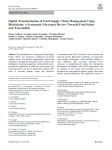
Article
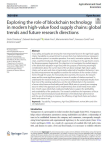
Article
G. Chiaraluce ; D. Bentivoglio ; A. Finco ; M. Fiore ; F. Conto ; A. Galati |Trust, safety, and quality are among the most important factors in the agri-food supply chains. Traceability is a powerful tool to ensure them, but implementing a transparent and effective system is a complex operation. As a result, innovative s[...]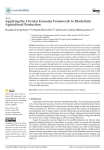
Article
Agriculture is one of the most economically important practices in the world; it is essential for food security and socioeconomic development in several countries. However, the use of pesticides, which are essential for fighting pests and weeds [...]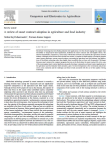
Article
Blockchain Technology has been finding industry-wide applications over the decade ranging from supply chain traceability to tamper-proof land registrations; facilitated by smart contracts and non-fungible tokens. The inherent immutability, trans[...]
Article
This study addresses significant concerns highlighted by the European Parliament regarding the decline of the Italian tomato processing industry, which possess a threat to Italy?s culinary heritage and global market position. This research offer[...]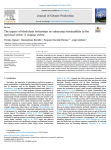
Article
P. Giganti ; M. Borrello ; P.M. Falcone ; L. Cembalo |Blockchain technology has the potential to address sustainability challenges in the agri-food industry. This scoping review analyzes 72 papers and finds that blockchain technology can enhance economic, environmental, and social sustainability. B[...]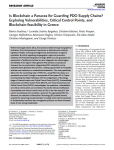
Article
M. Vasileiou ; L.S. Kyrgiakos ; C. Kleisiari ; P. Prosperi ; G. Kleftodimos ; A. Ragkos ; C. Tsinopoulos ; E. Abou Nader ; C. Moulogianni ; G. Vlontzos |Within food Supply Chains (SCs), food products labeled through Geographical Indications (GIs) hold paramount importance as distinctive and culturally significant entities, ensuring the integrity and distinctiveness of regional specialties. By st[...]
Article
D. Maric ; G. Vukmirovic ; R. Maric ; D. Nuseva ; K. Lekovic ; S. Vucenovic |This paper aims to analyze and define incentives for the implementation of modern technology and digitalization of the Food Supply Chain (FSC) in the function of sustainability of the food retail sector of the Western Balkans (WB) region. The su[...]
Article
K.U. Rehman ; S. Andleeb ; M. Ashfaq ; N. Akram ; M.W. Akram |Agriculture plays a vital role in global food security, but conventional practices have led to environmental degradation and health risks due to excessive use of agricultural nutrients and chemicals. In this era of increased consumer awareness a[...]
Article
F. Rampone ; F. Lecca ; P. Giolito ; M. Romano |This paper aims to demystify a lot of misconceptions still widely circulating today about the alleged properties of blockchain and then illustrate the real opportunities that this technology offers for 'food system' and how it must be correctly [...]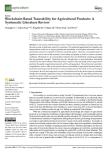
Article
In recent years, with the frequent crises of trust in the food industry, food safety issues have become an issue of particular concern to consumers. The traditional agricultural food logistics and transportation model can no longer guarantee the[...]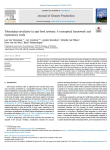
Article
This paper presents a conceptual framework that reflects the current state of thinking on tokenizing circularity in agri-food systems. The framework is built upon classifications of tokens and the key principles of circular economy and shows how[...]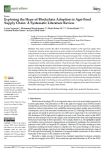
Article
L. Yogarajan ; M. Masukujjaman ; M.H. Ali ; N. Khalid ; L.H. Osman ; S.S. Alam |This study examines the effect of blockchain adoption on the agri-food supply chain. A systematic literature review approach was used to analyze and synthesize the findings from the existing literature, focusing on fundamental research themes, r[...]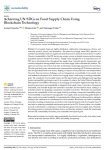
Article
Food supply chains are highly distributed, collaborative, heterogeneous, diverse, and varied by product, process, and destination. The global food supply chain (FSC) objective is to maintain a good balance between supply and demand and move prod[...]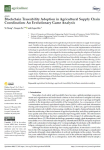
Article
Blockchain technology has brought about profound revolutions in supply chain management. Notably, in the agricultural sector, blockchain-based traceability has become an essential tool to maintain the safety and quality of farm commodities. Howe[...]
Thèse, Mémoire, Master
Ce mémoire s’intéresse aux avantages potentiellement offerts par la blockchain dans l’alimentaire tels que perçus par les consommateurs. A cause des scandales et des crises sanitaires, la confiance des consommateurs dans le système alimentaire s[...]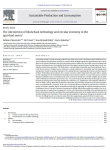
Article
A. Pakseresht ; A. Yavari ; S.A. Kaliji ; K. Hakelius |A transition towards a circular economy within the agri-food sector requires the improvement of efficiency in resource utilization, the prevention of food loss or waste, whilst adopting regenerative agricultural practices. In addition to the tec[...]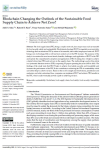
Article
A.S. Saha ; R.D. Raut ; V.S. Yadav ; A. Majumdar |The food supply chain (FSC), being a complex network, faces major issues such as traceability, food security, safety and sustainability. Blockchain technology (BLCT) is regarded as an innovative technology that can transform FSC by means of its [...]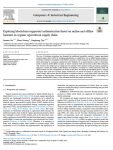
Article
The rise of blockchain technology has disrupted the traditional traceability method of organic agricultural products supply chain (OASC) by emerging authentication or certification. For an offline business scenario, a blockchain certification tr[...]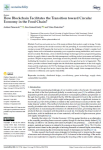
Article
Food loss and waste are two of the many problems that modern society is facing. To date, among many solutions, the circular economy is the one prevailing. A successful transition toward a circular economy (CE) requires the food sector to overcom[...]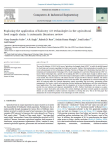
Article
V.S. Yadav ; A.R. Singh ; R.D. Raut ; S.K. Mangla ; S. Luthra ; A. Kumar |The need for Industry 4.0 (I4.0) is felt across “agriculture food supply chain (AFSC)” to tackle the global demand for food items and concerns regarding food safety and security. Further, this transformation is possible due to recent advancement[...]
Article
H.H. Khan ; M.N. Malik ; Z. Konecná ; A.G. Chofreh ; F.A. Goni ; J.J. Klemes |This study aims to investigate blockchain technology for agricultural supply chains during the COVID-19 pandemic. Benefits and solutions are identified for the smooth conduction of agricultural supply chains during COVID-19 using blockchain. Thi[...]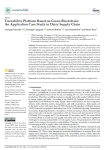
Article
Recent progress in IoT and software development has simplified data acquisition and immutability of information in the agri-food supply chain. In the last few years, several frameworks and applications were proposed to ensure traceability in the[...]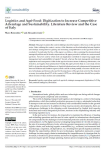
Article
This paper examines the current challenges faced by logistics with a focus on the agri-food sector. After outlining the context, a review of the literature on the relationship between logistics and strategic management in gaining and increasing [...]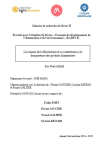
Thèse, Mémoire, Master
Ce mémoire s’intéresse aux apports de la blockchain à la transparence des produits alimentaires. Le besoin de transparence pour les consommateurs provient, en grande partie, de leur manque de confiance dans l’industrie alimentaire suite aux fame[...]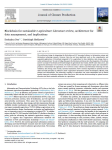
Article
The architecture design by integrating the blockchain and IoT has gained salience in information systems and information technology research. However, there has not been significant work on the comprehensive and sequential applications of blockc[...]
Article
The development of modern science and information technology has promoted social progress and created better conditions for the realization of smart agriculture. The core of smart agriculture is big data, but the current big data management mode[...]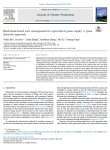
Article
Information and communication technology provides e-agriculture with data storage and data analysis capabilities, among which data collection is mainly achieved through a large number of sensors with limited computing and storage capabilities. S[...]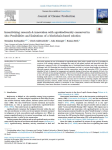
Article
This article explores the use of blockchain for agrobiodiversity (B4A) with a specific focus on (i) providing an overview of the existing regulatory challenges that result in sub-optimal research and innovation with agrobiodiversity conserved in[...]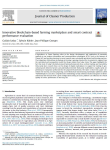
Article
E-Agriculture, or Smart Farming, refers to the design, development, and application of innovative methods to use modern information and communication technologies (ICTs), such as the Internet of Things (IoT) and machine learning, to move towards[...]










